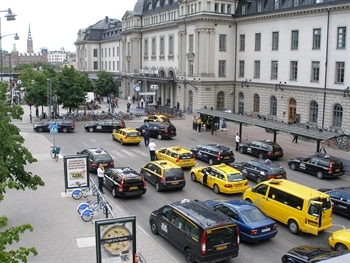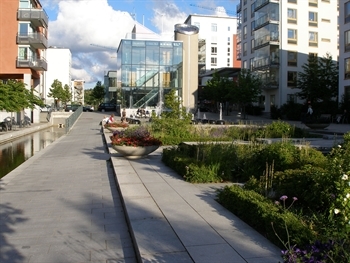

Stockholm Public Transit currently operates the world’s largest ethanol bus fleet and has plans to use 100 percent renewable fuels by 2025 (currently at 25 percent).
The Bombardier Peer Exchange unites experts from diverse global cities to examine common problems and promising solutions in researching, implementing and operating emergent transit and land use policies around the world. To bring innovation and insight to metropolitan Chicago’s transportation discussion, the Metropolitan Planning Council (MPC) has released Learnings from Stockholm and Berlin: A Summary of Transit Innovations, which highlights key transportation innovations in these European cities and applies those learnings to a local context.
Cordon Pricing: Stockholm

Drivers entering or exiting Stockholm, Sweden, are charged a fee that fluctuates based on the current level of traffic congestion. After just two years, the city reduced traffic by 25 percent, travel times by 30 to 50 percent, vehicle emissions by 10 to 14 percent, and saw a corresponding increase of 40,000 mass transit users per day.
MPC found traffic congestion costs the Chicago region $7.3 billion every year in wasted time, fuel and environmental damages. In MPC’s July 2010 report The Road Less Traveled: Exploring Congestion Pricing in Chicagoland, the data suggest that by better managing new highway capacity, the region may be able to curb its congestion problem and generate additional revenue that can be reinvested into the transportation network, including transit.
Unified Card System: Berlin
After Berlin unified in 1998, transit passengers found themselves using multiple tickets with fare structures that differed between each of the service providers. VBB, the regional public transportation authority for the Berlin region, created a unified fare card system, allowing people to travel on every mode of local public transit in the region using a single ticket. Fares are collected by the regional agency and re-distributed to the operating agencies based on monthly ridership.
The Chicago region has three transit service providers: Metra, Pace, and Chicago Transit Authority (CTA), and transfers can be difficult and confusing for riders. A regional approach to fares would be a popular and effective tool. The Regional Transportation Authority (RTA) has been studying the possibility of a universal fare card that would be accepted by all three service providers, to help maximize the effective movement of people throughout the Chicago region.
Transit-Oriented, Environmentally Friendly Development: Stockholm

Formerly a brownfield industrial site, Hammarby Sjöstad is one of Stockholm’s largest mixed-use urban development projects, with 9,000 apartments for approximately 20,000 residents. The neighborhood design incorporated renewable energy, waste reduction, ecological building materials, and alternative transportation options. A renewable fuel-fired district heating plant supplies energy for the community, combustible waste is recycled as heat, and food waste composted into soil. Besides the bike lanes, buses, and light rail, there is a ferry across Lake Hammarby Sjö from early morning until midnight and a carpool system available to local residents.
On Chicago’s South Side, construction of a new $4 billion planned development will begin in 2013 to turn the abandoned U.S. Steel Southworks site into a thriving mixed-use community. The project vision includes 13,575 single-family homes and high-rise units, almost 18 million sq. ft. of commercial space, 125 acres of open space, parks, bike paths, and a marina with 1,500 boat slips. The redevelopment known as Southworks Lakeside is planned to be built as a LEED-ND certified community, with a stormwater management plan to return 95 percent of the site’s stormwater to Lake Michigan. It is located within a five-minute walk of two Metra stations and numerous CTA bus lines.
To learn more about how Berlin and Stockholm applied innovative transportation solutions to address congestion and other transportation and land use challenges, read Learnings from Stockholm and Berlin: A Summary of Transit Innovations.
NEWS
Local News
Rahm solicits comments on public transportation – CTA Tattler “Mayor-elect Rahm Emanuel has named his Transportation and Infrastructure transition team, and is taking public comments on transportation issues at his website. At least three members of the transportation transition team have CTA or public transportation ties and experience.”
Report: More than 2,200 Illinois bridges "structurally deficient" – WBEZ.org “A report out Tuesday shows one out of every 12 bridges in Illinois is deteriorating. The study by Transportation for America, a transportation advocacy coalition, says 2,239 of the state's 26,337 bridges — about 8.5 percent — are "structurally deficient." That means engineers have found a major defect in a bridge's deck or support structure, according to the report.”
St. Louis to Chicago high-speed rail link gathers steam – St. Louis Beacon “The St. Louis to Chicago high-speed rail link picked up steam on Tuesday when Illinois Gov. Pat Quinn announced a $685 million agreement to start the next phase of what he hopes will become the nation's pre-eminent fast line.”
Dear Chicago: Green the fleet – WBEZ.org “Scientist urges the city to invest in environmentally-friendly vehicles. Between sanitation trucks, fire engines, and police SUVs, the City of Chicago owns its fair share of motor vehicles — nearly 13,000 in all, according to the Department of Fleet Management. And fueling them up is not cheap: in 2010 the city spent more than $24 million on gasoline and diesel fuel.”
National News
U.S. Senators Propose New Infrastructure Fund – The Wall Street Journal “A bill backed by two senators and the U.S. Chamber of Commerce Tuesday would establish a $10 billion infrastructure fund to lure private investors to public-works projects.”
Soaring gas prices lead to surge in public transportation – WREG.com “Soaring gasoline prices are driving more Middle Tennesseans to turn to public transportation. Officials are reporting that ridership on bus routes in the nine mid-state counties that make up the Regional Transportation Authority is up 23 percent from last year.”
Environmental Impact of Congestion Pricing - CMAP Updates “The Federal Highway Administration’s (FHWA) Office of Operations recently released the report Synthesis of Congestion Pricing-Related Environmental Impact, which summarizes the state of the practice and provides a framework for evaluating the environmental impacts of congestion pricing projects.”
Two planes land at Washington airport without controller help – CNN.com “Two planes landed safely early Wednesday morning at Washington's Reagan National Airport after they were unable to reach anyone at the airport's air traffic control tower, according to the FAA and the National Transportation Safety Board. The FAA would not comment on a media report that the airport controller had fallen asleep. NTSB spokesman Peter Knudson said, "All we know is the controller was unresponsive and we want to know why."
Transportation panel approves rail plan, doesn't say how to pay for it – The Republic “A state transportation panel has approved Arizona's first comprehensive rail plan for building a passenger rail network. What's lacking is how to pay for it. The Arizona Republic reports the 139-page plan proposes building billions of dollars' worth of rail links and improvements to passenger and freight networks.”
Oklahoma Department of Transportation celebrates 100 years – NewsOK.com “The Oklahoma Department of Transportation is celebrating its centennial with numerous events, including an exhibit of vintage automobiles from collections of members of the Sooner Regional Group of the Horseless Carriage Club of America.”
Oklahoma Department of Transportation celebrates 100 years – NewsOK.com “The Oklahoma Department of Transportation is celebrating its centennial with numerous events, including an exhibit of vintage automobiles from collections of members of the Sooner Regional Group of the Horseless Carriage Club of America.”
Global News
New funding not enough to close Canada's infrastructure gap, report says – Progressiverailroading.com “Increased public funding won’t be enough to address Canada's deteriorating infrastructure needs now or in the future, according to the Conference Board of Canada's new report.”
Bombardier Launches PrimoveCity for the Next Generation of Zero Emission, Multi-modal, Electric Mobility – Marketwire.com “Bombardier today announced the launch of BOMBARDIER PrimoveCity, its new e-mobility solution, together with the establishment of a new centre of competence to enable the next generation of electric mobility.”
Toronto bike share program to start May 3 – CBC news “Torontonians will be able to make use of the Bixi bike sharing program starting May 3. The City of Toronto said in a Tuesday release that some 1,000 bicycles would be available from 80 locations south of Bloor Street between Spadina Avenue and Jarvis Street.”
Contact Information
For comments, suggestions, or submissions, please contact Chantal Hayes, Communications Associate, at chayes@metroplanning.org or (312)-863-6019.
 | ||
Talking Transit is sponsored by  | ||
Upcoming events
|
||
|
Tell us what you think of Talking Transit. Email talkingtransit@metroplanning.org with feedback in the subject. To subscribe, visit our website at metroplanning.org/signup.html. To stop receiving this newsletter visit metroplanning.org/unsubscribe.html? |
Email design by Webitects
Metropolitan Planning Council | 140 S Dearborn St | Suite 1400 | Chicago, IL 60603Phone (312) 922-5616 phone | (312) 922-5619 fax | talkingtransit@metroplanning.org
Copyright © 2026 Metropolitan Planning Council. All rights reserved.
To stop receiving this newsletter visit metroplanning.org/unsubscribe.html?EmailMsgId=117&email=